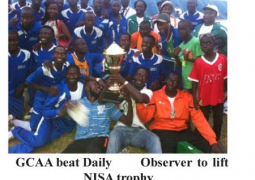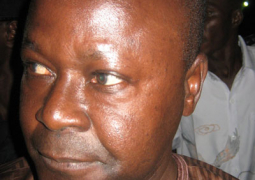The defence team in the case involving Lawyer Ousainou Darboe and 19 others yesterday asked the trial judge, Justice O. Ottaba of the Special Criminal Court, to stay proceedings on count 5 and 6 and refer them to the Supreme Court of The Gambia for determination.
The accused persons on the amended charge sheet are Ousainou Darboe, Kemeseng Jammeh, Femi Peters, Lamin Dibba, Lamin Jatta, Yaya Bah, Babucarr Camara, Fakebba Colley, Ismaila Ceesay, Momodou Fatty, Dodou Ceesay, Samba Kinteh, Mamudou Manneh, Nfamara Kuyateh, Fanta Darboe, Lamin Njie, Jukuna Suso, Momodou L.K. Sanneh, Yaya Jammeh and Masanneh Lalo Jawla.
When the case was announced, DPP Barkun appeared for the state along with A.M. Yusuf, A.Y. Ammah, A. Bah, M. Koita and E.R. Dougan.
The defence team was led by Senior Counsel A.A.B Gaye along with A.N. Bensouda, H.S. Sabally, O.M.M. Njie, A. Samba, R.Y. Mendy, N. Cham, Hajum Gaye, Lamin Darboe, Dayoh S. Small, M. Bachilly, Yasin Senghore, A. Sissoho, and S.M. Tambadou.
Making her submission before the court, counsel Hawa Sisay-Sabally said: “We have an application to make following the ruling of this court denying bail to the accused persons and the fact that two of the counts, which is a public order Act, raise questions.”
She said section 127 of the constitution gives exclusive original jurisdiction to the Supreme Court to determine any question whether any law was made in excess of the powers conferred by the constitution upon the National Assembly or any other person.
She added that subsection 2 of the said section states that “where it is raised there is no discretion and it is automatic that the court should stay proceedings and refer the matter to the Supreme Court for determination.”
“I refer my lord to sections 4 and 6 of the constitution which gives right to all citizens to defend the constitution. It is in defence of this constitution that the accused persons are asking this court to refer counts 5 and 6 to the Supreme Court for determination; their constitutionality and whether they are in excess,” she said, adding: “It is mandatory; there is no discretion.”
She said the following questions arise; whether section 5 of the public order Act, as in relation to the requirement of a permit or license from IGP for any public procession, is inconsistent with section 25 of the 1997 constitution which guarantees freedom of speech, expression and assembly; whether the said section 5 of the public order Act 1961 as amended was made in excess of the powers conferred by the constitution upon the National Assembly, and whether the said section 5 is null and void by section 4 of the 1997 constitution.
“We are, therefore, praying that this court refer these two counts which are public order Act with the questions that have arisen to the Supreme Court and for the court to stay proceedings,” she said.
“We are not asking for stay of proceedings on the case, but for the two counts and for it to be referred to the Supreme Court.”
In response, the DPP then said: “We are opposing the application, and need time to respond.”
“I am surprised that this is coming from the Director of Public Prosecutions and, due to the urgency of the matter at hand, DPP could just ask for a stand down to reply on the application. The accused persons are denied bail and time is of the essence,” said Senior Counsel Gaye.
The case was then adjourned until 9 May 2016, for reply on the application.



